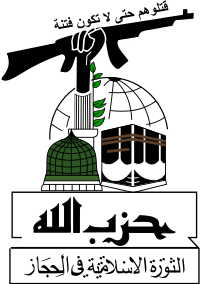Hezbollah Al-Hejaz
| Hezbollah Al-Hejaz حزب الله الحجاز | |
|---|---|
|
Hezbollah Al-Hejaz logo | |
| Leader(s) |
Abdelkarim Hussein Mohamed Al-Nasser Ahmed Ibrahim Al-Mughassil |
| Dates of operation | 1987–present |
| Motives |
|
| Active region(s) |
|
| Ideology |
Shi'a Islamism Wilayat al-Faqih |
Hezbollah Al-Hejaz (Arabic: حزب الله الحجاز; English: literally Party of God in the Hejaz), Hizbollah in the Hijaz or the Saudi Hizbollah, is a militant organization operating in Saudi Arabia, Kuwait and Bahrain. It is a Shi‘i organization founded in May 1987 in Saudi Arabia’s Eastern Province.[1][2] It is pro-Khomeini as opposed to the pro-Shirazi Organization for the Islamic Revolution in the Arabian Peninsula (OIR; Munazzamat al-Thawra al-Islamiyya).[3] It is outlawed in Saudi Arabia, being designated as a terrorist organization by the kingdom's government on 7 March 2014.[4]
Terror attacks
The Saudi Hizbollah is believed to have been responsible for a number of serious attacks in Saudi Arabia in the second half of the 1980s, including the August 1987 bombing of an Eastern Province gas plant and the March 1988 bombing of oil installations at Ras Tanura and Jubail, as well as a series of bombings in Riyadh in 1985 and 1989. Some have also suspected organized domestic Shiite involvement in the Hajj riots in Mecca in July 1987 in which more than 400 people died after Saudi police cracked down on demonstrating Iranian pilgrims. Questions also shroud the June 1996 Khobar Towers bombing, which was officially blamed on the Hizbollah of the Hijaz. The group may have wanted to assert its disapproval of the 1993 reconciliation between the Saudi Government and the OIR, and may have received operational assistance from the Lebanese Hezbollah. Some observers have disputed this assessment and argued that the operation was carried out by al-Qaida, while others have said that on balance, the available evidence suggests Shiite responsibility.[3]
Several of its members are wanted in the United States for their part in the 1996 Khobar Towers bombing.[5] The group is also charged by the FBI[6] with its participants Ahmed Al Mughassil, Ali Al Houri, Hani al-Sayegh, Ibrahim Al Yacoub, Abdelkarim Al Nasser, Mustafa Al Qassab, Abdallah Al Jarash, Hussein Al Mughis and a Lebanese "John Doe". Five more members are wanted on conspiracy indictments: Sa'ed Al Bahar, Saleh Ramadan, Ali Al Marhoun, Mustafa Al Mu'alem, and Fadel Al Alawe.
Moderation & Detente
In 1993 King Fahd, responding positively to the groups new goals and its change in rhetoric, met several of al-Saffar's followers. Desiring to end Shiite opposition to the government, Fahd promised to work towards improving conditions for Shiites in Saudi Arabia. This took the form of, amongst other things, ordering the elimination of derogatory terms for Shiites from textbooks, removing certain other forms of explicit discrimination, and of allowing many Saudi Shiite exiles to return to Saudi Arabia.[7] As a result of the October 1993 pact the Reform Movement was dissolved and its members had to formally and practically dissociate themselves from foreign groups and movements.[8]
On August 26, 2015, Ahmed Ibrahim Al-Mughassil had been captured in Beirut and transferred to Riyadh, Saudi Arabia.[9]
References
- ↑ Jones, Toby (3 June 2009). "Embattled in Arabia. Shi‘is and the Politics of Confrontation in Saudi Arabia" (PDF). Combating Terrorism Center at West Point. Retrieved 16 April 2012.
- ↑ Matthiesen, Toby (Spring 2010). "Hizbullah al-Hijaz: A History of The Most Radical Saudi Shi‘a Opposition Group". The Middle East Journal. 64 (2): 179–197. doi:10.3751/64.2.11. Retrieved 19 August 2013.
- 1 2 Hegghammer, Thomas (2009). "Jihad, Yes, But Not Revolution: Explaining the Extraversion of Islamist Violence in Saudi Arabia". British Journal of Middle Eastern Studies. 36 (3): 395–496. doi:10.1080/13530190903338938. Retrieved 16 April 2012.
- ↑ Nancy A. Youssef and Adam Baron (7 March 2014). "Saudi Arabia declares Muslim Brotherhood a terrorist group". Kansas City Star. Retrieved 8 March 2014.
- ↑ FBI statement on the Khobar Towers bombings Archived 26 July 2010 at the Wayback Machine. 21 June 2001
- ↑ FBI copy of the indictments Archived 12 April 2016 at the Wayback Machine. FBI
- ↑ Nasr, Vali (2007). The Shia Revival: How Conflicts within Islam Will Shape the Future. W. W. Norton & Company. p. 238.
- ↑ http://www.atimes.com/atimes/Middle_East/HJ26Ak02.html
- ↑
External links
- Terrorism charges have been brought against 13 members of the pro-Iran Saudi Hizballah at FBI
- Saudi Hezbollah GlobalSecurity
